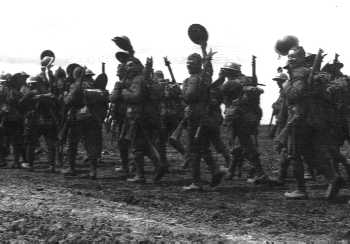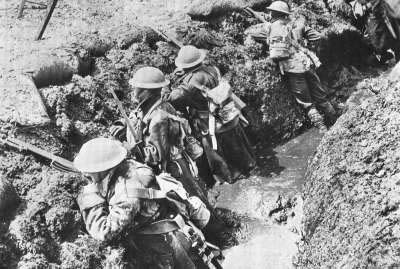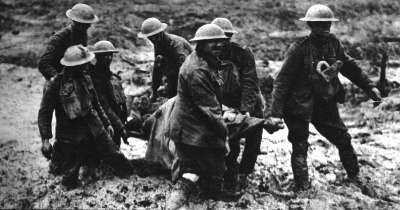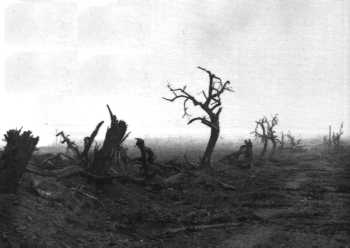Anthem for Doomed Youth
by Wilfred Owen

What passing-bells for those who die like cattle? |

The Parable of the Young Man and the Old
|
So Abram rose, and clave the wood, and went, And took the fire with him, and a knife. And as they sojourned, both of them together, Isaac the first-born spake, and said, My Father, Behold the preparations, fire and iron, But where the lamb for this burnt-offering? Then Abram bound the youth with belts and straps, And builded parapets the trenches there, And stretched forth the knife to slay his son. When lo! an angel called him out of heaven, Saying, Lay not thy hand upon the lad, Neither do anything to him. Behold, A ram, caught in a thicket by its horns; Offer the Ram of Pride instead of him. But the old man would not so, but slew his son, And half the seed of Europe, one by one.
|

ARMS AND THE BOY
|
Let the boy try along this bayonet-blade How cold steel is, and keen with hunger of blood; Blue with all malice, like a madman's flash; And thinly drawn with famishing for flesh.
Lend him to stroke these blind, blunt bullet-leads,
For his teeth seem for laughing round an apple.
|

DULCE ET DECORUM EST
|
Knock-kneed, coughing like hags, we cursed through sludge, Till on the haunting flares we turned out backs, And towards our distant rest began to trudge. Men marched asleep. Many had lost their boots, But limped on, blood-shod. All went lame, all blind; Drunk with fatigue; deaf even to the hoots Of gas-shells dropping softly behind.
Gas! GAS! Quick, boys!--An ecstasy of fumbling
In all my dreams before my helpless sight
If in some smothering dreams, you too could pace
"Sweet and fitting it is to die for one's country." (From Horace, Odes, III. ii. 13) |

AT A CAVALRY NEAR THE ANCRE
|
In this war He too lost a limb, But His disciples hide apart; And now the Soldiers bear with Him.
Near Golgotha strolls many a priest,
The scribes on all the people shove
|

Desolation of landscape of what once was a tree lined road to Guillemont
after extensive artillery bombardment during the Battle of the Somme.
STRANGE MEETING
|
Down some profound dull tunnel, long since scooped Through granites which Titanic wars had groined. Yet also there encumbered sleepers groaned, Too fast in thought or death to be bestirred. Then, as I probed them, one sprang up, and stared With piteous recognition in fixed eyes, Lifting distressful hands as if to bless. And by his smile, I knew that sullen hall; With a thousand fears that vision's face was grained; Yet no blood reached there from the upper ground, And no guns thumped, or down the fluies made moan. "Strange, friend," I said, "Here is no cause to mourn." "None," said the other, "Save the undone years, The hopelessness. Whatever hope is yours, Was my life also; I went hunting wild After the wildest beauty in the world, Which lies not calm in eyes, or braided hair, But mocks the steady running of the hour, And if it grieves, grieves richlier than here. For by my glee might many men have laughed, And of my weeping something has been left, Which must die now. I mean the truth untold, The pity of war, the pity war distilled. Now men will go content with what we spoiled. Or, discontent, boil bloody, and be spilled. They will be swift with swiftness of the tigress, None will break ranks, though nations trek from progress. Courage was mine, and I had mystery; Wisdom was mine, and I had mastery; To miss the march of this retreating world Into vain citadels that are not walled. Then, when much blood had clogged their chariot-wheels I would go up and wash them from sweet wells, Even with truths that lie too deep for taint. I would have poured my spirit without stint But not through wounds; not on the cess of war. Foreheads of men have bled where no wounds were. I am the enemy you killed, my friend. I knew you in this dark; for so you frowned Yesterday through me as you jabbed and killed. I parried; but my hands were loath and cold. Let us sleep now ... Wilfred Owen
|

 Back to Wilfred Owen Page
Back to Wilfred Owen Page